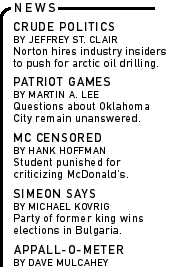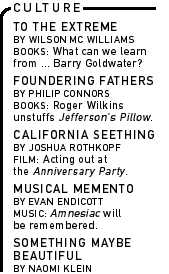

|

|

|

|
|
|
| |
|
|
|
Tristan Kading's first reaction was disgust. The 15-year-old Stonington High School sophomore, a vegetarian and animal rights supporter since elementary school, entered the cafeteria on May 22 for a mandatory assembly and saw a McDonald's banner draped over one of the tables. A guidance counselor had invited the fast food corporation to make a presentation on job application and interview skills. Kading says students had to watch a video about "how great it is to work at McDonald's." The company's four representatives wore McDonald's hats. One woman led the presentation while the other three reps set out fruit juice and cookies for the kids. They were given coupons for free meals at McDonald's for filling out job applications. Kading volunteered to participate in a mock job interview with the McDonald's rep
"That won't get you a job at McDonald's," the representative replied. "Good, I wouldn't want to work at McDonald's," Kading added. "They falsely advertise their french fries as vegetarian," referring to the recent controversy over the company's failure to disclose that beef extract was used in flavoring its fries. Calling Kading an "embarrassment to the school," a teacher sent him to the principal's office. Kading, fearing suspension, apologized to the McDonald's representative and read an apology over the school's intercom. "I had to do something. McDonald's--a company I hate more than a lot of other companies--was in our school," says Kading, a soft-spoken teen-ager who is especially critical of the company's role in the destruction of South American rainforests to graze cattle for hamburgers. For the past decade, cash-strapped school districts have succumbed to the temptation to accept corporate programming and advertising. But critics say these offers come at the expense of educational goals. "Schools, we hope, are teaching critical thinking skills," says Emily Heath of the San Francisco-based Center for Commercial Free Public Education. "Advertising is antithetical to that. It teaches them to believe whatever is presented to them and to take what your school endorses." Job search skills are usually taught by teachers in the classroom, Stonington Superintendent Michael McKee says, but many schools are trying to "make things more relevant for students." "It was not the belief that the student had about McDonald's" that was being punished, McKee contends, "but rather the disruption of a presentation of which there was educational content." McKee notes that the job applications passed out at the assembly were for demonstration purposes only and not collected. McKee says that Kading's punishment sends an important message to students: "There are forums in which our opinions or political statements are accepted and oftentimes even sought after," such as the school paper and town meetings. "These forums become the most effective ways to get our beliefs known." Stonington High School senior Billy Ware dismisses this idea: "It's not like he got up there cursing. He made an educated remark about a current event." The issue of beef flavoring in McDonald's fries, Ware notes, "is something that's in the court system." "The assembly was the best time for him to say something," adds James Morren, a junior at Stonington. He says the controversy might cause a lot of students who hadn't heard of animal rights to become interested. Contrary to McKee, these students believe it was Kading's politics that got him into trouble. They note that he was dealt with more harshly than the student who was just sent back to his seat for making the lewd remark. Morren and Ware agree that if corporations are allowed in schools,
then alternate voices should also be represented--conscientious
objectors to balance Army recruiters, PETA
activists to respond to McDonald's. "It was blatant self-advertising,"
Ware says of the assembly. "I don't support McDonald's in any way.
But when they came into the school, I had to listen to them. The
worst was when they handed out the coupons--like one french fry
to each kid." A version of this article originally appeared in the New Haven Advocate.
|


